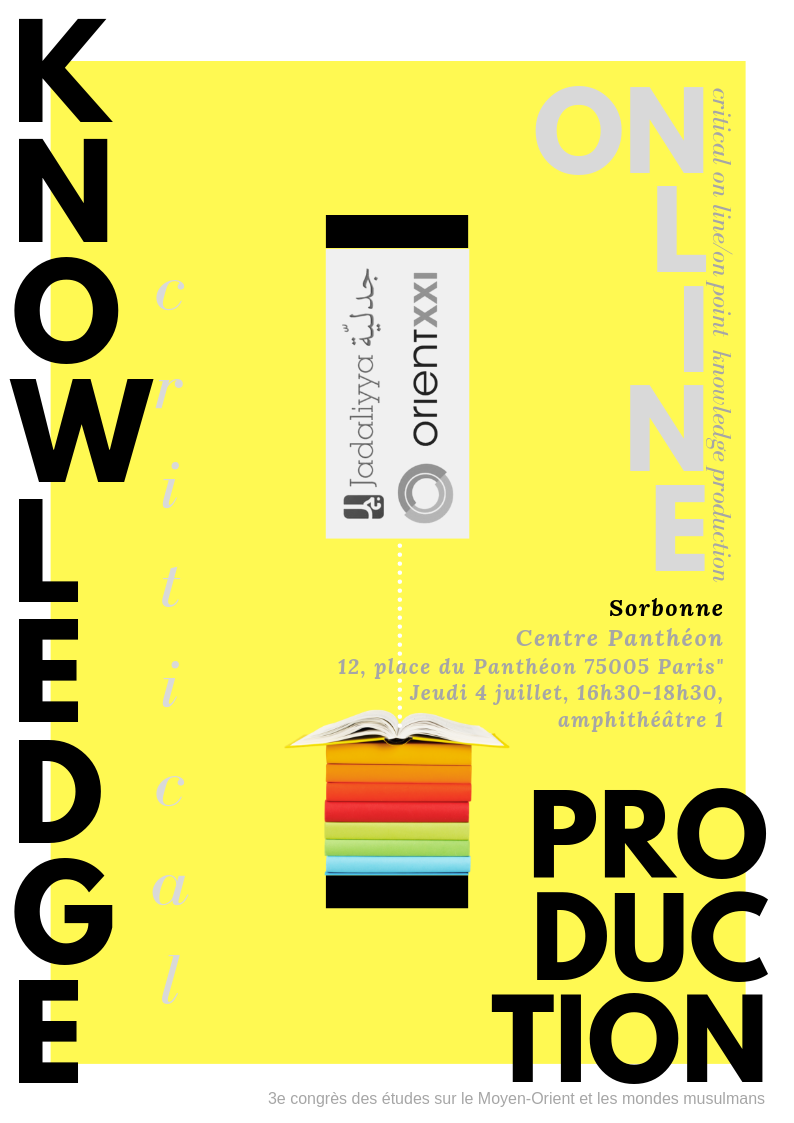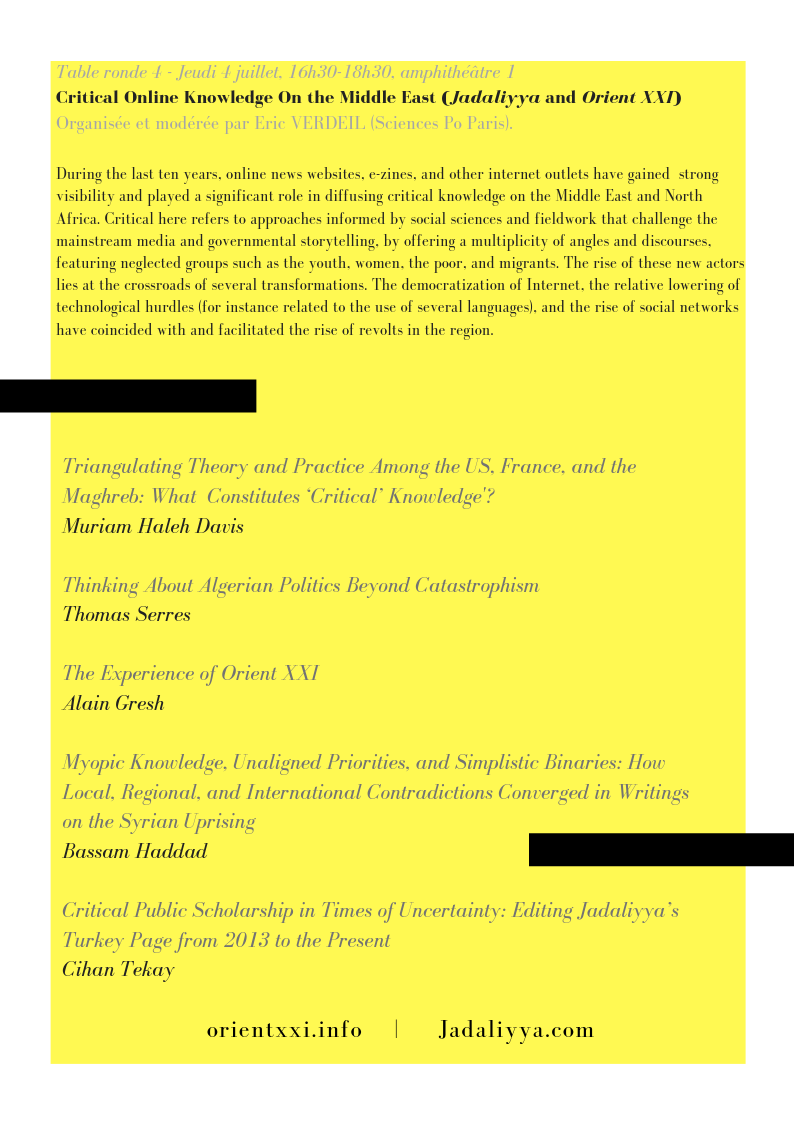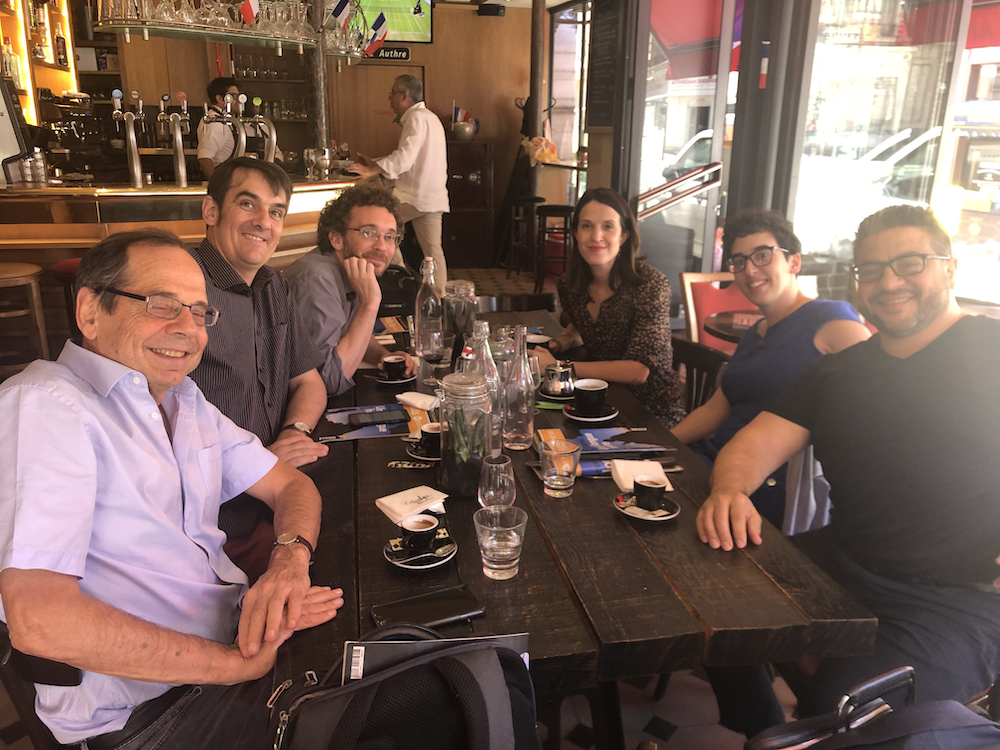[This piece is part of a roundtable held in Paris last July at the 4th GISMOM Conference (July 2019) of the French network on the study of the Middle East and the Muslim World. This panel included lectures by Cihan Tekay, Muriam Haleh Davis, Thomas Serres, Bassam Haddad, Alain Gresh, and was organized by Eric Verdeil. All lectures from the panel will be posted in the coming weeks.]
La place du Maghreb dans le champ des études sur le Moyen Orient reste, aux États-Unis, parfois ambigue. Par exemple, si on inscrit ces pays dans l’histoire du monde arabe, la question de la langue arabe est incontournable. En même temps, les trois pays du Maghreb central (l’Algérie, le Maroc et la Tunisie) participent aussi sans conteste de l’histoire coloniale de la France. En plus de ces questionnements sur le positionnement du Maghreb à cheval entre plusieurs aires géographiques – avec les enjeux de formation linguistiques et méthodologiques associés – cette région a été historiquement un lieu important pour l’articulation de la théorie critique aux États Unis. Dit autrement, le tournant « linguistique » aux États-Unis a fait du Maghreb un de ses objets par excellence, une tendance moins forte dans le champ scientifique en France.
En effet, un changement est intervenu dans les années 1990 au moment où, en France, la guerre civile empêchait la recherche en Algérie, et les dynamiques du terrorisme et de la violence devenaient des préoccupations majeures sinon incontournables. Au même moment, aux Etats-Unis les études « postcoloniales » gagnaient en importance. Edward Saïd a publié L’Orientalisme en 1978, soit une dizaine d’années avant les manifestations d’Octobre 1988 qui ont ébranlé le système du parti unique en Algérie. Il est intéressant de se remémorer que Saïd lui-même avait écrit sur les intellectuels et la production de savoir au Maghreb, notamment en se penchant sur Camus et l’Algérie.
Cette période des années 1990 marque une nette divergence de trajectoire. Des concepts comme « hybridité » et « identité » sont devenus des outils théoriques importants dans le monde anglophone, alors que dans le même temps les circonstances politiques et historiques autour de la Méditerranée rendaient cet accent sur le « discours » ridicule sinon dangereux ; le mot « identité » en Français, par exemple, évoque tout de suite son cousin « identitaire » qui a pris un sens de plus en plus menaçant, notamment à travers l’idée d’un repli identitaire touchant aussi bien la France que les sociétés maghrébines.
Réfléchir à la circulation du savoir - ou à l’impossibilité de le faire circuler, en fonction des contextes – nous place frontalement face à des constats non dépourvus d’ironie. En effet, les bases théoriques du champ des études postcoloniales sont largement issues, il faut le rappeler, de l’histoire de la colonisation française en Afrique du Nord. Le Maghreb, dans cette configuration historique, ne peux pas exister comme objet de recherche aux États-Unis sans des discussions sur la théorie française, en particulier autour de figures comme Fanon, Sartre, Camus, Derrida, entre autres. Quand j’ai commencé mon master en Middle Eastern Studies en 2004, cette présence de la théorie française pesait énormément sur les études sur le Maghreb. Pour ma part, je faisais partie d’une génération de chercheurs et chercheuses qui ont été formé.e.s en arabe et qui trouvaient au contraire qu’il était nécessaire de porter un regard sur le Maghreb qui n’était pas complètement soumis à cette histoire et cette tradition intellectuelle coloniale et postcoloniale.
Si je fais ce petit détour personnel et historique pour parler de la place du Maghreb aux États-Unis, c’est parce que je crois que ce contexte est indispensable pour comprendre la trajectoire – et les défis – auxquels a fait face la page Maghreb de Jadaliyya, un projet auquel je suis associée depuis 2011. Les premiers articles que j’ai écrits pour la page ont tous été marqués par un intérêt pour le Maghreb en tant qu’espace postcolonial. Je suivais l’approche dominante aux États-Unis, en me concentrant sur des questions de culture, de représentation, sur la décolonisation et la trajectoire des intellectuels français. Dans le même temps, plusieurs de ces discussions ont pu générer une certaine dose du scepticisme en France. Un scepticisme qui peut même devenir de l’hostilité dans certains milieux. Pour prendre un exemple qui est, je pense, révélateur, j’utilise dans mon travail la notion de capitalisme racial. Il s’agit de réfléchir à la manière dont les catégories raciales deviennent une source de valeur économique et sociale pour le système capitaliste ; en d’autres termes, cette conceptualisation dépasse le simple constat que certains groupes raciaux sont disproportionnellement exploités par le système capitaliste et vise à comprendre la place de la race dans l’organisation du système économique lui-même. Cette discussion est issue des débats multiples sur l’esclavage et la race dans le contexte américain, mais elle sert aussi à réfléchir aux actions des technocrates français travaillant sur le développement économique en Algérie dans les années 1960. Pourtant, nul besoin de rentrer dans les détails pour comprendre les résistances que ce cadre analytique peut rencontrer en France. Et j’en comprends tout à fait la raison. J’admets que si la théorie postcoloniale est un acquis aux Etats-Unis, elle peut aussi devenir parfois un peu caricaturale. Par exemple, le mot « identité » est souvent utilisé dans une manière très floue, à tort et à travers. Ici je renvoie à l’article de Fred Cooper et Rogers Brukaber sur ce sujet. Certaines catégories provoquent plus de confusion que de clarté, même quand elles sont légitimes (je pense par exemple à la notion d’islamophobie).
Cette discussion sur le choix de mots m’amène à une autre observation liée à mon titre : qu’est-ce que c’est qu’un savoir « critique » ? Est-ce qu’il s’agit d’un savoir – ou d’une méthode – qui est critique en soi, de manière presque universelle, ou est-ce que son apport est forcément enraciné dans un contexte intellectuel particulier, et même une culture intellectuelle nationale ?
Si le savoir a toujours circulé, il l’a fait d’une manière inégale. Les idées peuvent profiter de connivences intellectuelles. En même temps, elles peuvent parfois être bloquées ou obligées de prendre un trajet un peu moins direct. Je me souviens de la première fois où j’ai présenté un papier sur l’usage de la théorie postcoloniale afin d’analyser les langages de contestation en Algérie, en 2012. J’ai compris tout de suite que mon sujet – que je considérais personnellement avoir un apport « critique » - ne l’était pas le moins du monde. Non seulement ma conférence n’était pas critique, mais elle était aussi à peine compréhensible pour mes auditeurs algériens, à cause de mes cadres analytiques et d’un style de présentation qui leur était parfaitement étranger pour ne pas dire tout simplement étrange.
Je crois que ces difficultés sont révélatrices du chemin que nous avons parcouru. La page Maghreb a commencé dans un registre très conforme avec ces habitudes scientifiques nord-américaines : elle se focalisait sur l’histoire intellectuelle et la production culturelle. Et le terrain nous a progressivement ramené à la raison : la révolution en Tunisie et la contestation au Maroc puis en Algérie nous ont orienté vers une autre grille de lecture. Je faisais ma recherche doctorale à ce moment, j’en ai donc profité pour solliciter des collègues algériens afin de participer à la page Maghreb et de décrire les réalités de l’Algérie contemporaine. Face aux limites d’une analyse des conditions locales par des observateurs étrangers, il y a des formes de critiques, intellectuelles, linguistiques, pédagogiques, qui ne peuvent être produites que depuis l’Afrique du Nord. Je pense notamment à un entretien que m’a accordé Daho Djerbal en 2012.
Ce qui permet à un site comme Jadaliyya d’exister et d’être pertinent d’un contexte à l’autre est précisément sa capacité à rassembler des regards et des voix extrêmement divergentes. Lorsque l’on propose un article scientifique pour une revue de sciences humaines, par exemple, on ne cible ni le grand public ni une espèce de république des lettres internationale. Nos traditions intellectuelles sont parfois très différentes, et nous apprenons très tôt à respecter les codes scientifiques du pays où l’on veut être un jour embauché. Publier ses idées c’est, après tout, une question de réussite professionnelle.
Traduire des articles de l’anglais, vers le français et vers l’arabe permet de maintenir un dialogue avec des militants et des citoyens, et d’essayer d’avoir une discussion aussi polyphonique que possible. Pourtant, il y a des moments où, au moment de la traduction, nous nous posons la question de l’intelligibilité du discours. Est-ce que ce que je dis en anglais peut être entendu en français, ou en arabe ? Est-ce que ce que je dis aux Etats-Unis, et qui me semble très critique, n’apparaît pas comme parfaitement réactionnaire en France ou en Algérie ? Donc je voudrais juste conclure avec le fait que la traduction est parfois très compliquée – pas à cause de la langue, mais parce que certains arguments ne sont pas lus sur le même registre politique. Je ne vais pas rentrer dans les détails car il s’agit d’exemples assez sensibles, mais il y a eu au sein de l’équipe des discussions parfois tendues sur la possibilité de traduire certains articles en arabe ou l’intérêt de publier certains arguments en français. En bref, en réfléchissant sur la circulation et la production de savoir entre ces trois espaces : le Maghreb, les États-Unis et la France, on se retrouve face à une évidence : l’idée de la pensée critique n’est pas nécessairement universelle. La condition même de sa circulation est un effort de traduction qui prend en compte les particularités des espaces concernés. Être critique, c’est aussi évaluer continuellement les contours de ce qui est intelligible et ce qui ne l’est pas.
______________________________


